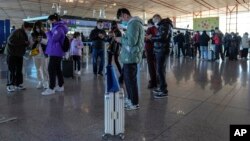A requirement that travelers to the U.S. from China present a negative COVID-19 test before boarding their flights expired Friday after more than two months as cases in China have fallen.
The restrictions were put in place December 28 and took effect January 5 amid a surge in infections in China after the nation sharply eased pandemic restrictions and as U.S. health officials expressed concerns that their Chinese counterparts were not being truthful to the world about the true number of infections and deaths. The requirement from the U.S. Centers for Disease Control and Prevention expired for flights leaving after 3 p.m. Eastern time Friday.
When the restriction was imposed, U.S. officials also said it was necessary to protect U.S. citizens and communities because there was a lack of transparency from the Chinese government about the size of the surge or the variants that were circulating within China.
The rules imposed in January require travelers to the U.S. from China, Hong Kong and Macau to take a COVID-19 test no more than two days before travel and provide a negative test before boarding their flight. The testing applies to anyone 2 years and older, including U.S. citizens.
China saw infections and deaths surge after it eased back from its “zero COVID” strategy in early December after rare public protests of the policy that confined millions of people to their homes and sparked demands for President Xi Jinping to resign.
But as China eased its strict rules, infections and deaths surged, and parts of the country for weeks saw their hospitals overwhelmed by infected patients looking for help. Still, the Chinese government has been slow to release data on the number of deaths and infections.
The U.S. decision to lift restrictions comes at a moment when U.S.-China relations are strained. U.S. President Joe Biden ordered a Chinese spy balloon shot down last month after it traversed the continental United States. The Biden administration has also publicized U.S. intelligence findings that raise concern Beijing is considering providing Russia weaponry for its ongoing war on Ukraine.




